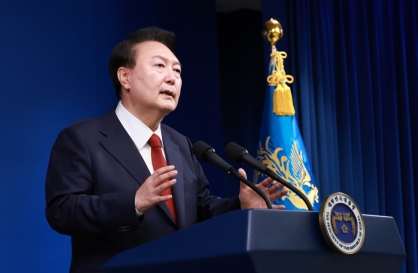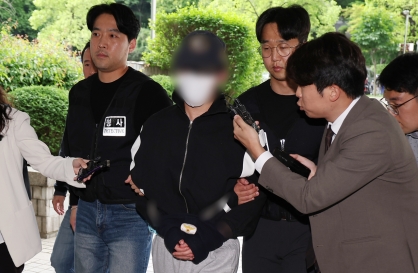Prosecutors and police are at each other’s throats again, this time over the investigation of a prosecutor who was accused of verbal assault and abuse of power by a police officer.
The case involves a police officer in Miryang, South Gyeongsang Province, who filed a complaint in January against a prosecutor in Changwon, the seat of the provincial government, for insulting him and abusing his power in directing and supervising the investigation of a private waste treatment company.
The police officer sent his complaint to Cho Hyun-oh, commissioner of the National Police Agency. Cho, who locked horns with Prosecutor General Han Sang-dae last year over the investigation rights of police officers, ordered an NPA unit to investigate the case directly.
The Seoul Central Prosecutors’ Office ordered the NPA to transfer the case to a police station in Miryang or a nearby area, citing a clause in the Criminal Procedure Act, which stipulates that the territorial jurisdiction of the court shall be determined by the place of offense.
Cho defied the order, describing it as an attempt to stymie a police investigation into the prosecutor. Cho pointed out that transferring the case to a police station in Miryang or a nearby region would put police investigators under the direction of the accused prosecutor in Changwon.
Cho also noted that the NPA often launch investigations into crimes regardless of where they have been committed.
Yet the NPA commissioner had to follow the prosecution’s order as it was based on the Criminal Procedure Act. He transferred the case to a police station in Daegu, near Miryang.
According to the NPA, the accused prosecutor stopped the complainant police officer last November from expanding his investigation into a waste disposal company, which was suspected of having buried industrial waste in rice fields.
The police officer alleged that the prosecutor stonewalled his investigation because the company’s lawyer was a former prosecutor who had worked for the Changwon District Prosecutors’ Office.
Prosecutors and police have been engaged in an irritating turf war since early last year. In Korea, prosecutors have the authority to direct and supervise police officers in criminal investigations. But the police have been rightly demanding that this order-obedience relationship be changed into a more cooperative one.
Last year, the Prime Minister’s Office weighed in to resolve the dispute between the two powerful law enforcement agencies. The renewed clash indicates the PMO’s intervention has failed to settle the problem. The friction between the two agencies should not be allowed to continue. President Lee Myung-bak should put an end to it in one way or another.
The case involves a police officer in Miryang, South Gyeongsang Province, who filed a complaint in January against a prosecutor in Changwon, the seat of the provincial government, for insulting him and abusing his power in directing and supervising the investigation of a private waste treatment company.
The police officer sent his complaint to Cho Hyun-oh, commissioner of the National Police Agency. Cho, who locked horns with Prosecutor General Han Sang-dae last year over the investigation rights of police officers, ordered an NPA unit to investigate the case directly.
The Seoul Central Prosecutors’ Office ordered the NPA to transfer the case to a police station in Miryang or a nearby area, citing a clause in the Criminal Procedure Act, which stipulates that the territorial jurisdiction of the court shall be determined by the place of offense.
Cho defied the order, describing it as an attempt to stymie a police investigation into the prosecutor. Cho pointed out that transferring the case to a police station in Miryang or a nearby region would put police investigators under the direction of the accused prosecutor in Changwon.
Cho also noted that the NPA often launch investigations into crimes regardless of where they have been committed.
Yet the NPA commissioner had to follow the prosecution’s order as it was based on the Criminal Procedure Act. He transferred the case to a police station in Daegu, near Miryang.
According to the NPA, the accused prosecutor stopped the complainant police officer last November from expanding his investigation into a waste disposal company, which was suspected of having buried industrial waste in rice fields.
The police officer alleged that the prosecutor stonewalled his investigation because the company’s lawyer was a former prosecutor who had worked for the Changwon District Prosecutors’ Office.
Prosecutors and police have been engaged in an irritating turf war since early last year. In Korea, prosecutors have the authority to direct and supervise police officers in criminal investigations. But the police have been rightly demanding that this order-obedience relationship be changed into a more cooperative one.
Last year, the Prime Minister’s Office weighed in to resolve the dispute between the two powerful law enforcement agencies. The renewed clash indicates the PMO’s intervention has failed to settle the problem. The friction between the two agencies should not be allowed to continue. President Lee Myung-bak should put an end to it in one way or another.









![[K-pop’s dilemma] Time, profit pressures work against originality](http://res.heraldm.com/phpwas/restmb_idxmake.php?idx=644&simg=/content/image/2024/05/08/20240508050705_0.jpg&u=20240508171126)








![[Today’s K-pop] Stray Kids to drop new album in July: report](http://res.heraldm.com/phpwas/restmb_idxmake.php?idx=642&simg=/content/image/2024/05/09/20240509050659_0.jpg&u=)